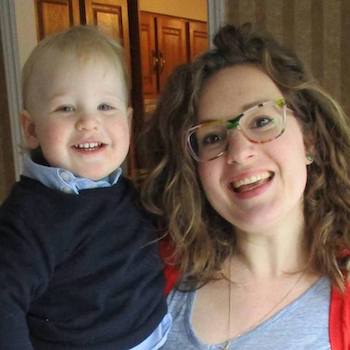I was a late talker. We spoke French at home and it took a while to learn to read English, but I loved every minute of it. I remember, around age 8 or 9, finishing my first “book with no pictures.” It was one of the Narnia books. I ran into my parents’ bedroom early one morning before school to tell them. I remember sitting on the bed, just staring at the novel in my hand, with so much pride. I could read!! It opened up a whole new world for me.
It didn’t take long before I started dreaming about becoming “an English Professor”. I majored in English Literature at university and looked forward to the day when I’d be giving the lectures.
In a first-year course in Literature I ran into a friend who would turn out to be, and is still, one of my closest friends. Her name is Melanie and she was also on her way to being an English Professor. We became fast friends, and I learned after a time that she was a devout Christian. I told her once, casually, that we didn’t need to discuss religion because “I was a Christian too.” But I soon learned that she was a lot more serious about her faith than I was. I found this to be both annoying and intriguing.
Between my second and third year of studies, we travelled to Europe together and between visiting Stratford-Upon-Avon, Jane Austen’s birthplace, the homes of Thomas Hardy, Charles Dickens, and others, we also discussed “her” faith—that is, I peppered Melanie with questions about other religions, sexuality, and anything else I could think of to disprove her dogmatism. We often came to an impasse and moved on.
One day, after returning to school that fall, we were walking home after a confusing class on postmodern literature. A professor had been arguing that the concept of “intertextuality” proves that “truth doesn’t exist,” because every book—even the Bible—has borrowed something from elsewhere. So I said to Melanie, “You really need to let go of your dogmatism, because as you can see, intertextuality proves that blacks-and-whites don’t exist!!” To which she responded, “Erika, blacks-and-whites may not exist, but I know one thing to be true: Jesus died on the cross for my sins.”
In this moment, something “lit up” for me. It was as if a light bulb went on. I already knew I believed in that part. Up to then, I had refused to allow myself to accept the truth. There was a logical problem for me, an intellectual resistance that said ‘intelligent people shouldn’t accept Jesus‘. I think my heart probably had wanted to accept for months, but my head resisted. In that conversation, the truth was exposed so clearly that I ran out of excuses. That moment opened the door in my head for where my heart already wanted to go.
Immediately, I went home, shut my bedroom door, knelt by my bed, and prayed to Jesus. I hardly knew what I was praying; the words just came to me. Jesus, I want to be with you forever. Jesus, please come into my life. Jesus, I am a sinner and I need you. Soon I could feel a Presence in my room with me. It was so powerful I was afraid to open my eyes. And I remember suddenly realizing that the Person who had been walking with me for my whole life, through all my trials and sorrows, through my joys and my scars, had a name now. It was Jesus.
I did finish my Master’s in English Literature, but I didn’t followed my dream to completion. My experience of Jesus was so powerful that my career eventually changed direction. I went to seminary and became a church pastor.
Psalm 37, especially verses 3-6, have always been meaningful to me:
Trust in the Lord and do good;
dwell in the land and enjoy safe pasture.
Take delight in the Lord,
and he will give you the desires of your heart.
Commit your way to the Lord;
trust in him and he will do this:
He will make your righteous reward shine like the dawn,
your vindication like the noonday sun. – Psalm 37:3-6
As much as it’s great to know and do things with our careers and attain that kind of success in this life, our purpose is simpler than that. All we need to do is take delight in God—and our deepest desires and needs will be met. Before Jesus, A PhD in English Literature was the highest, noblest, most beautiful way I could think to spend my life. After Jesus, I have discovered much deeper desires. They have been met by Him. It sounds simple, but that’s what happened.
There’s a story of a woman named Mary, who sits with Jesus instead of doing her chores. Her sister complains about this, and in response, Jesus says “Mary has chosen what is better [that is, to be with Jesus], and it will not be taken away from her” (Luke 10:38-42).
Jesus transformed the way I think, the way I perceive reality, and the way I measure success.
This is why I believe.
Erika is a homeschooling mother and seminary student in Nova Scotia, Canada.
You can see more people sharing the reason for the hope that they have here: Why Believe?

Leave a Reply